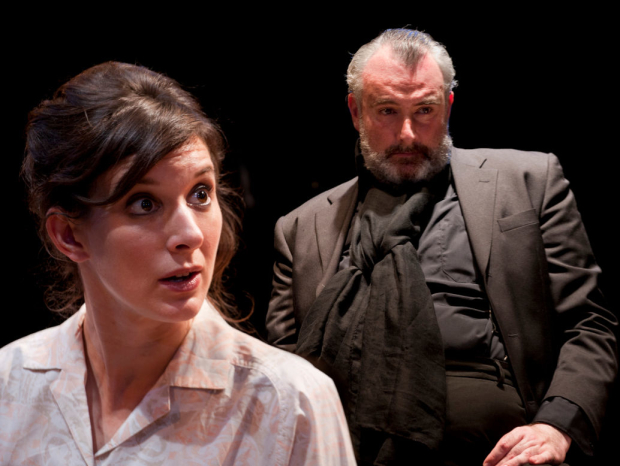Orson's Shadow (Southwark Playhouse)
Welles and Olivier go head to head in Austin Pendleton’s drama

© Simon Annand
Olivier had just triumphed in The Entertainer, reinventing himself for the new Royal Court style. Welles had become becalmed artistically, weighed down by the masterpiece he had made aged 25, Citizen Kane. When Tynan finds him in Dublin, he's playing Chimes of Midnight to next to nobody. "When and where did you hear the rumour that I've been playing to empty houses?" bellows Welles. "I heard it tonight," the critic replies, "from the other member of the audience."
Austin Pendleton's play, written for a Chicago audience that needs London's landscape explaining, takes us into rehearsals: Larry struggling, out-acted by his young lover Joan Plowright and incapable of taking direction; Welles, fat and frustrated, stewing in the corner; Tynan, as dramaturg, looking on in despair; Vivien Leigh breezing in uninvited, completely gone with the wind.
'Playing Olivier, as an actor, must be like asking a boxer to fight like Ali'
The pleasure is seeing these titans treading the boards again, but, for all Pendleton's play revels in theatreland bitchiness, it's a serious examination of the artistic temperament. Ego is the death of good art and there's plenty to go round here, but art reinvents itself and Olivier and Welles can't keep up. Alice Hamilton's production is quick to mock their pretensions, but it never finds the full agony of lost superpowers. Tynan, likewise, is beset by a stammer, incapable of matching the flair and fluency of his writing in person.
Early on, the critic halts proceedings, choking on his own expositional dialogue. He orders the house lights up and spoofs the sort of stage phone call in which the speaker parrots everything the caller has said. Having skewered the trope though, Pendleton uses it freely to fold in theatre history. Characters constantly remind one another of their achievements and indiscretions and there's enough dirty laundry here to start a second-hand clothes shop. It might be a device to flag up old fashions, but it makes the play stutter.
Playing Olivier, as an actor, must be like asking a boxer to fight like Ali. It means measuring up to a legend: "Pound for pound," Tynan wrote, "the greatest actor alive." You need the voice, clipped as cut-glass, and, physically, the mix of muscularity and camp. Adrian Lukis just about gets away with it, which is, I suppose, the best one could hope for. His Olivier is brittle, but bullish – pay him a compliment and he comes to life like a human statue – but he can't act for toffee and Lukis risks sending him up.
The same goes for John Hodgkinson's Welles, gorging on steak and booming directorial advice to the heavens. Edward Bennett, however, nails Tynan: all awkward wrists and spindle fingers, he finds the self-consciousness of the natural born critic that sees his own flaws. Louise Ford, by contrast, finds Plowright's unaffected ease – and, though reduced at one point to ferrying teas around, suggests that, all things being equal, she could have been the best of them. She was overshadowed, but never outshone.
Orson's Shadow runs at Southwark Playhouse until 25 July












